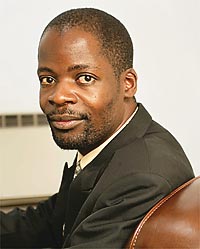 I was moved by an old article by Ethan Zuckerman on aid to Africa that he capture during the TED conference in Tanzania Last year in which he captured views of a Kenyan economist on Aid and opportunity to Africa. Below are excerpts from the article:
I was moved by an old article by Ethan Zuckerman on aid to Africa that he capture during the TED conference in Tanzania Last year in which he captured views of a Kenyan economist on Aid and opportunity to Africa. Below are excerpts from the article:
Africa’s economic weakness comes from a failure to commercialize the resources and inventions of the continent, this is according to a self taught Kenyan economist, James Shikwati who is urging Africans to “stop addressing problems and start addressing African opportunities.” Famine, he tells us, is a business challenge: 200 million people are facing food shortage, and they’re a market. Malaria, with 300-500 million cases a year and $12 billion in economic loss, is an economic opportunity.
Chris Anderson references his now-legendary interview in Spiegel, reported under the title, “For god’s sake, please stop the aid“. He is “shockingly misguided, amazingly wrong,” according to Jeffrey Sachs… which makes him very popular already with some of our audience.
“How can you say you don’t have a job in Africa when there are all these opportunities?” Shikwati points to a new Kenyan business focused on indoor insecticide spraying, protecting houses from roaches and mosquitoes for six months. The cost is affordable - from 100 to 400 Kenyan shillings - and providing this service is an entrepreneurial opportunity for otherwise unemployed Kenyans.
The challenge for Africa is for businesses to move beyond their home countries and spread throughout the continent. “What’s missing is not money, but confidence.” Shikwati suggests that use culture to introduce people to business and build their confidence. He wants to “create passion amongst the youth” through business competitions and awards.
He fears there’s a “constrained vision” that Africans suffer from, a need to release the African mind. “If I eat yams, people say I’m poor - I should eat bread. That’s nonsense.” It’s the result of cultural preconception, he believes. “People are looking at African entrepreneurs as corrupt and untrustworthy
- a leader may be corrupt, but Africans are not corrupt.” To succeed, Africans need to challenge these stereotypes, internally and externally.
From the outside, Shikwati tells us, “Aid looks quite sexy. If we see a beggar on the street, we feel we should help him.” But this might not be the right decision. “If you’ve been giving us aid and have made us lose confidence in ourselves… I think you are not helping Africa.” Instead, he asks Shikwati to invest in Africa, or to allow the Africans to sell their products globally. But African companies have to step up as well. “How many indigenous African businesses are ready to tap into COMESA, a market of 400 million people? Or East African Community , a market of 100 million people.”
Shikwati warns us that “countries bring not just aid, but their companies.” If we’re not careful, we end up putting ourselves in a situation where we’re waiting for aid instead of innovating - “we need to be competing with international business”
For all your business information, Trends and Tips from around the world.
Business in Focus is now published at Teyie.com.
For all your business information, Trends and Tips from around the world, Check out our new blog HERE | Teyie.com
Friday, January 25, 2008
“For god’s sake, please stop the aid” …..to Africa?
Labels: Africa and poverty
Subscribe to:
Post Comments (Atom)

No comments:
Post a Comment